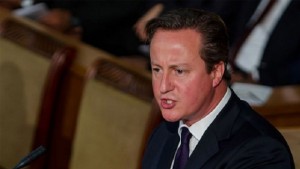 KINGSTON, Jamaica, Thursday October 1, 2015 – United Kingdom Prime Minister David Cameron has announced a quadrupling of his government’s support to the Caribbean, but has essentially rejected calls for his country to pay reparations, saying it is time to leave the past behind and move on.
KINGSTON, Jamaica, Thursday October 1, 2015 – United Kingdom Prime Minister David Cameron has announced a quadrupling of his government’s support to the Caribbean, but has essentially rejected calls for his country to pay reparations, saying it is time to leave the past behind and move on.
Speaking to the joint Houses of Parliament in Jamaica yesterday, as he announced a package of over £360 million (US$545.8 million) of bilateral aid, he said slavery was and is abhorrent in all its forms and “has no place whatsoever in any civilized society and Britain is proud to have eventually led the way in its abolition”.
But he also made it clear that there were no reparations coming from his country.
“That the Caribbean has emerged from the long, dark shadow it cast is testament to the resilience and spirit of its people. I acknowledge that these wounds run very deep indeed. But I do hope that, as friends who have gone through so much together since those darkest of times, we can move on from this painful legacy and continue to build for the future,” Cameron said.
The aid package announced yesterday includes: £300 million (US$454.8 million) for a new UK-Caribbean Infrastructure Partnership Fund to build new ports, roads and bridges to boost trade and growth; £30 million (US$45.4 million) to make health facilities more resistant to natural disaster; and £30 million (US$45.4 million) for new programmes to support economic growth.
“It will make us the largest donor to the region. It will create jobs and save lives and you can take it, literally, as a concrete statement of my commitment to the Caribbean,” Cameron told Parliament.
“(It is) not tied aid. It is cash grants. It is up to you in this room and in the region to decide how best to spend it on the things that your country needs most. I’m confident that this support will make a decisive difference to the economic future of this region.”
It was also announced that the UK Chevening Scholarships for the Caribbean would be doubled and support in the fight against serious and organized crime in the region would be enhanced.
Cameron, who left Jamaica yesterday to head to Grenada in the last stop on his first Caribbean trip as UK prime minister, said his country wants to help the Caribbean on a path to development, acknowledging that Britain had taken the ties between the two sides for granted.
“I believe that Britain can help the Caribbean countries on their path of development – lifting people out of poverty, increasing economic growth, trade and security, and creating opportunities for young generations. That’s in your interest but it’s firmly in our interest too,” he said during a meeting with his Grenadian counterpart Dr. Keith Mitchell and Cabinet.
“I think there is some truth in those who say Britain has taken this relationship for granted for too long and I want to put that right. Our relationship should be based on the countries we are today and the opportunities we can generate together, rather than over-relying on the historical ties of the past. Britain wants to be your partner for the future, your partner of choice and I hope my visit can be the start of that.”
Britain’s International Development Secretary Justine Greening, who accompanied Cameron on the trip, noted that too many Caribbean countries are held back because they remain vulnerable to severe economic or climate shocks. “With some of the highest energy costs in the world, it is difficult for businesses to compete in global markets, leading to decades of slow or declining growth,” Greening said.
“Britain’s close relationship with the Caribbean and our new support will help boost growth and kick-start economic recovery across the region as well as creating important trade and investment opportunities for the UK.”
During his trip to Grenada, Cameron went to the small town of Gouyave with Mitchell and visited the sole nutmeg processing plant remaining after Hurricane Ivan hit the island in September 2004.
